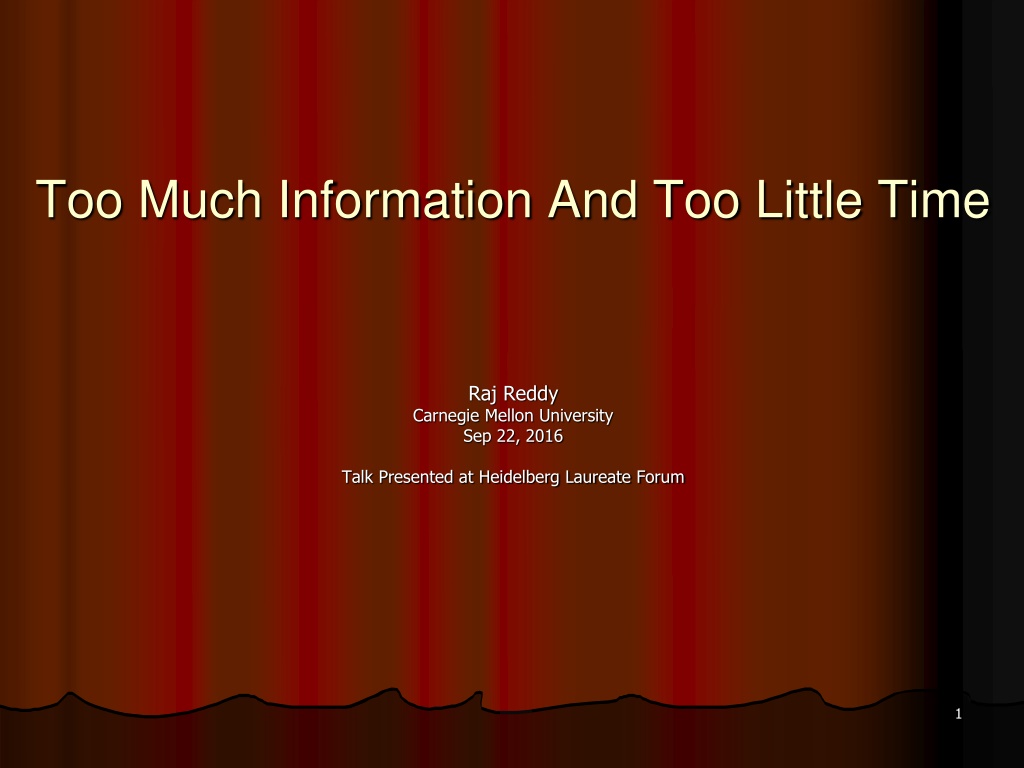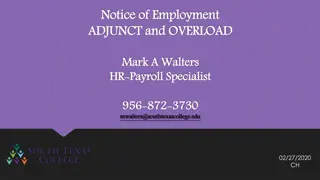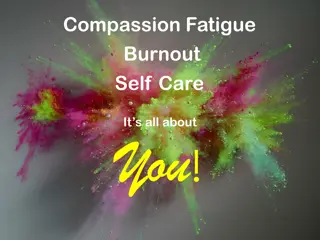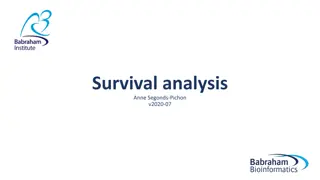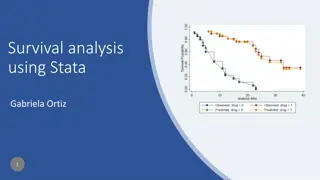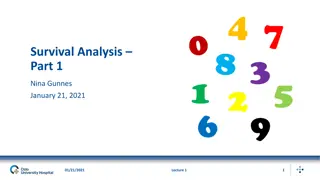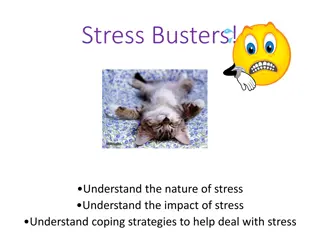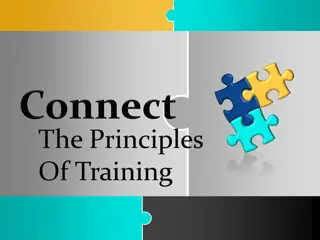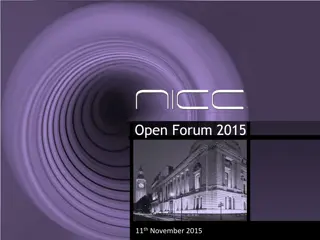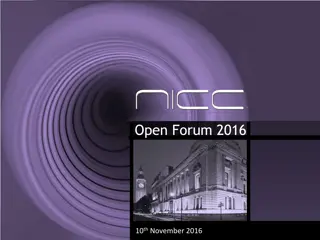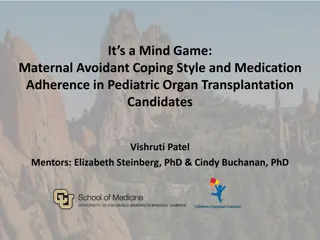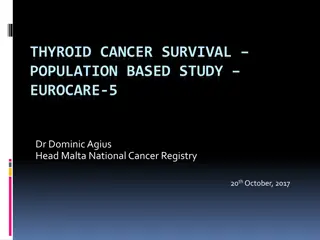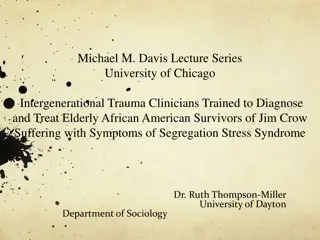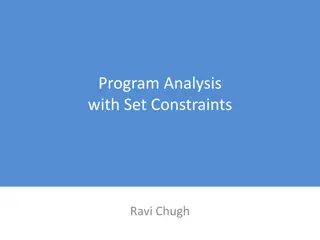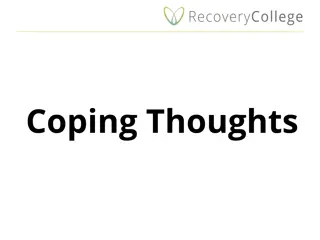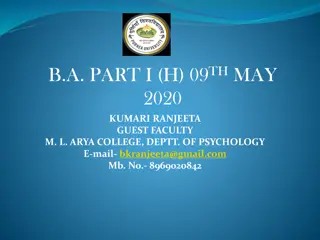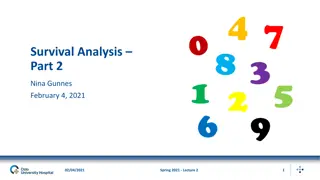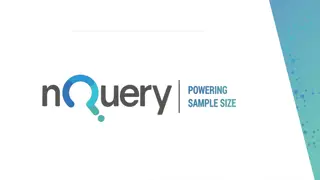Coping with Information Overload and Time Constraints: Strategies for Survival
The information-rich society poses challenges of handling excessive data within limited time. Concepts like Bill of Rights for information access and understanding human limitations and strengths provide insights into mitigating errors, leveraging knowledge effectively, and addressing common cognitive challenges. Strategies such as intelligent help, multimedia documentation, unlimited undo options, and cognition amplifiers offer solutions for human tendencies like impatience and favoring least effort in utilizing technology.
Download Presentation

Please find below an Image/Link to download the presentation.
The content on the website is provided AS IS for your information and personal use only. It may not be sold, licensed, or shared on other websites without obtaining consent from the author. Download presentation by click this link. If you encounter any issues during the download, it is possible that the publisher has removed the file from their server.
E N D
Presentation Transcript
Too Much Information And Too Little Time Raj Reddy Carnegie Mellon University Sep 22, 2016 Talk Presented at Heidelberg Laureate Forum 1
Bill of Rights for Surviving in an Information Rich Society Getting the right information e.g. search engines To the right people e.g. categorizing, routing At the right time e.g. just-in-time (task modeling, planning) In the right language e.g. machine translation In the right medium e.g. using speech for language divide and literacy divide With the right level of detail (granularity) e.g. summarization Carbonell, Language Technology Institute Manifesto 2
Human Limitations and Human Strengths Lessons from Cognitive Science Understand Human Limitations People Make Errors Tend To Forget Become Impatient Tend To Favor Least Effort Understand Human Strengths People Learn From Experience Tolerate Errorful, Ambiguous And Imprecise Input Exploit Vast Amounts Of Knowledge Communicate Using Speech And Natural Language Too Much Information And Too Little Time
Human Limitations and Options To Err is Human Lead to Catastrophic loss of data ( I didn t mean to do that ) and Unanticipated side-effects What happened? Caused by Sensory, Cognitive and Motor overload Like being in a traffic jam Current solutions: Partial Undo and ^C Future Options: Unlimited Undo and Anytime Abort To Forget is Human A non-expert occasional user can t be expected to remember the details Forgetting is caused by the loss of indexing structure Current solutions: Recognition vs. recall: Menus and On-line manuals Future Options: Intelligent Help How do I and What if Multi-media documentation (Why not YouTube Model?)
Human Limitations and Options (cont.) To Be Impatient is Human Waiting time to get the answer in interactive problem solving Long Start-up and Shutdown Times Network operations: Unpredictable retrieval and browsing times Current solutions: Hour glasses, Wheels and Progress Bars No idea how long it will take Future Options: Updates in the background, Learn from experience, Look ahead retrieval and computation To Favor Least Effort is Human Most people use a minimal subset of functionality in Word, PowerPoint, etc. Most people avoid tasks requiring too much cognitive effort e.g. PGP (too much work) and FTP (too complex) Causes: Principle of Least Effort Future opportunities: Autocomplete and Cognition Amplifiers
Human Limitations and Human Strengths Lessons from Cognitive Science Understand Human Limitations People Make Errors Tend To Forget Become Impatient Tend To Favor Least Effort Understand Human Strengths People Learn From Experience Tolerate Errorful, Ambiguous And Imprecise Input Exploit Vast Amounts Of Knowledge Communicate Using Speech And Natural Language Too Much Information And Too Little Time
Video Illustrating Human Capabilities That Computers Can t Match, Yet Link to Video: www.rr.cs.cmu.edu/ff.wmv
Missing Science of Human Capabilities Lessons from Flash Forward Video SILKy Interfaces Speech, Image, Language and Knowledge Forgiving Interfaces: Tolerate error and ambiguity You Bet --- Did That Mean Yes? Learning from Experience: Incremental non- intrusive knowledge acquisition Darn --- Would you Care to Define It? Intelligent Help, Advice and Tutoring Enthusiasm Detected --- Care to View Large Screen? Intelligent Agents: Task Execution Get me Sam Gallagher, Try Every Number
Human Limitations and Human Strengths Lessons from Cognitive Science Human Limitations People Make Errors Tend To Forget Become Impatient Tend To Favor Least Effort Human Strengths People Learn From Experience Tolerate Errorful, Ambiguous And Imprecise Input Exploit Vast Amounts Of Knowledge Communicate Using Speech And Natural Language Too Much Information And Too Little Time
Too Much Information and Too Little Time Drowning In Too Much Information and Too Little Time Severely lacking tools to cope with the problem Not a new problem, but the scale of the data and data rate has changed dramatically As early as 1969, Simon discussed the problem of Wealth of Information and Scarcity of Attention in Computers, Communications and Public Interest, Martin Greenberger 1971 Spawned the Field of Attention Economics White House Analogy Need-to-Know Principle Re-structure information: Organize, Summarize and Hyperlink Overview, Zoom, Filter and Details on Demand Simon on Reading Newspapers: It is a complete waste of time Social Networks like Facebook viewed primarily as entertainment
Key Principles of Information Overload Bounded Rationality and Satisficing When Faced with Information Overload, People Settle for Good Enough Solutions in Preference to Optimal Solutions When human thinking capabilities are overloaded, People use strategies and tactics of optimal-least-computation Optimal-least-computation is the study of approximate algorithms to find the best possible solution given limited memory capacity, limited time, or limited bandwidth Wealth of Information and Scarcity of Attention When faced with too much information and too little time, Embrace the Need-to-Know-Principle, by creating Summarization Tools Information Structuring Tools Use Techniques of Journalism and Cinematography Overview, Zoom, Filter and Details on Demand (Hyperlink the Details) Autocomplete Actions Non Intrusive Notifications
Cognition Amplifiers and Guardian Angels Cognition Amplifiers and Guardian Angels are two families of intelligent Agents that help with scarcity of attention problem A Cognition Amplifier is a Personal Enduring Autonomic Intelligent Agent that anticipates what you want to do and helps you to do it with less effort Buying and selling: Transact with multiple providers Email: Filter spam, understand and respond to actionable email News: Based on topic preferences, novelty, collaborative filtering Banking: Monitor bank account, Credit Cards, Pay Bills Travel: Flights, hotel, schedule disruptions, cancellations A Guardian Angel is a Personal Enduring Autonomic Intelligent Agent that Discovers And Warns You About Unanticipated Events That Could Impact Your Safety, Security, and Happiness Just-in-Time Warnings: Hurricanes, Tornados, Tsunami, Earthquakes, Flooding, Extreme Weather Accident Alerts and Rerouting; Transport Strikes Scarcity of Essential Resources: Food, Energy, Water etc. Thousands of Cogs and Gats as Personal Assistants? 12
Architecture of Cogs and Gats Cogs and Gats are Mobile Apps (like a shadow) for Each Person on the Planet Unlike APPs of today, Cogs are Mass-customized to Each Individual Designed to be Non-intrusive, Autonomic, and Device Independent Always On, Always Present and Always Working Always Learning Enduring (life-long) Cogs and Gats Monitor, Analyze and Learn From Experience; Learn From Own Experience And Experience of Others And share knowledge with a community of Cogs and Gats Automated Discovery of Data and Information Sources Data, suitably anonymized, can be used to learn appropriate responses for every possible situation by Learning preferences by observing user choices, Learning by task similarity and user similarity, Learning by error correction and Simply learning thru clarification dialog ( does that mean yes? Would you care to define it?). 13
Conclusion Pay Attention to Human Strengths, Limitations and Needs NEVER Intrusive Ads on the right or bottom, no animation Abolish Dialog Boxes - Replace with Notifications! Replace Live Tiles with WIWTBDIWC Glasses and Watches To Invisible Wearables Scarcity of Attention Implies Creation of Tools for Minimization of Human Effort Use Cogs Autocomplete Tasks, not Just Text Use Gats to Help with Unpredictable Events Avoid Redesigns that Require Re-Learning Ribbons in Word Win 7 to Win 8 $10 Rule: Are You Willing to Pay Every Customer $10 Every Time You Radically Change Look And Feel Of Your Software Product? One Size Fits All Software Personalized Modular Software Personalize and Mass-customize everything
Vision: Cognition Amplifiers Maxim is Activity Monitoring enables Intention Awareness enables Cognition Amplifiers enables 80%+ Automation Intention Awareness can be Inferred from Prior Activity Patterns of the User (and Others with Similar Profile) Intention Awareness enables Creation of Personal Autonomic Cognition Amplifiers (Cogs) Cogs are created by continuously monitoring multimodal sensors on modern smart phones, and discovering and interpreting user activities and intentions thru non-intrusive learning technologies. The Activity Monitoring System non-intrusively adapts and creates personalized Cogs using Cog Templates from the Platform providers and Cog developers Cogs enable Automation of Much of the Human Work and Daily Personal Activities Than One-size-fits-all Apps No matter what the user is trying to do (not just search) intention aware computing and Cogs will enable the user to do the tasks faster, with fewer errors, and less cognitive load.
